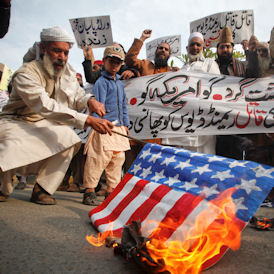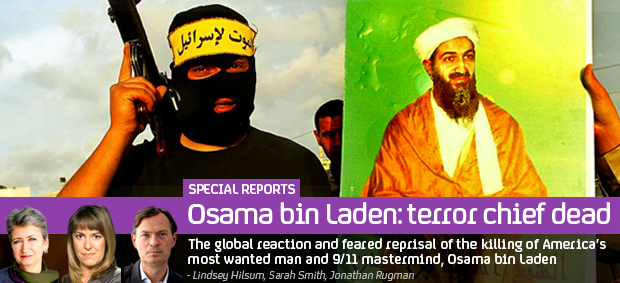WikiLeaks shows US-Pakistan relations mired in distrust
A series of WikiLeaks files shed new light on the relationship of distrust between the United States and Pakistan over the whereabouts of Osama bin Laden.

US Navy SEALs located and killed the al-Qaeda leader in Abbottabad, northern Pakistan, on Monday, but did not inform security officials in the country prior to carrying out the mission and did not request permission to land.
Reports are now emerging out of Pakistan that the mission is being regarded as an affront to its sovereignty, and diplomatic relations appear to have been be strained as a result.
But the covert operation to kill America’s most wanted man can hardly have been a surprise to Pakistan’s leaders. In one 2009 WikiLeaks cable the potential for the US to carry out unilateral missions against terrorist suspects is described as if it were an explicit policy.
It reads: “The relationship for too long has been transactional in nature. It also has been based on mutual mistrust. Pakistan hedges its bets on cooperation because it fears the US will again desert Islamabad after we get Osama Bin Laden; Washington sees this hesitancy as duplicity that requires we take unilateral action to protect US interests.”
The cable goes on to paint the relationship between the US and Pakistan as one hampered by mutual suspicion and disappointment.
“After 9/11, then President Musharraf made a strategic shift to abandon the Taliban and support the US in the war on terror, but neither side believes the other has lived up to expectations flowing from that decision,” it reads.
Channel 4 News Special Reports: Pakistan drone warfare
“The relationship is one of co-dependency we grudgingly admit-Pakistan knows the US cannot afford to walk away; the U.S. knows Pakistan cannot survive without our support.”
US misgivings about the strength of Pakistan’s leadership and its ability to root out bin Laden, and the acute belief that elements within the ISI, the country’s intelligence services, could be working against the US, are so widespread they were repeated in a security meeting in Tajikistan.
In another WikiLeaks cable from 2009, Tajikistan’s Deputy Chairman for Counterterrorism, General Abdullo Sadulloevich Nazarov, implied that the ISI has repeatedly tipped off bin Laden’s camp that their location had been compromised.
The cable reads: “‘We would have destroyed them long ago,’ Nazarov said, if other countries didn’t manipulate terrorist groups for “geopolitical goals.” For instance, in Pakistan, Osama Bin Laden wasn’t an invisible man, and many knew his whereabouts in North Waziristan, but whenever security forces attempted a raid on his hideouts, the enemy received warning of their approach from sources in the security forces.”
The US belief in the existence of rogue elements within the ISS was reflected in its concerns about the leadership qualities of Pakistan’s president, Asif Ali Zardari.
Further cables, also from 2009, refer to “the [Pakistan leadership’s] persistent lack of coordination and message control,” and calls attention to a fractious relationship between President Zardari and Prime Minister Gilani, who was “was lashing out because everyone saw him playing second fiddle to the President”.
US reservations about the reach of Islamabad’s power are noted in the cable, when American officials record that “Zardani said he was very realistic about the power of the army ‘given our history’.”
What the cables reveal about US concerns over Zardani’s authority and distrust over sections within the ISI could go some way to elucidating why American intelligence officials have repeatedly denied any knowledge of bin Laden’s whereabouts.
In 2010, Leon Panetta, director of the CIA, said there have been no leads on Bin Laden’s whereabouts since the “early 2000s”.
More from Channel 4 News: Cameron says Britain will continue to support Pakistan
But WikiLeaks documents showed that in August 2006, bin Laden had been attending regular meetings in villages on the border between Pakistan and Afghanistan.
The cable read: “A high-level meeting was held where six suicide bombers were given orders for an operation in northern Afghanistan. These meetings take place once every month.” Reports are also emerging that US intelligence officials had a good idea as to the location of bin Laden since 2009, a year before Panetta denied having any firm leads.
WikiLeaks founder Julian Assange told Indian television that from his research, the US has long-held doubts about the ISI.
“An example that was given of the United States referring to a particular individual who might have been Osama bin Laden, a photograph taken by US agents, and the Pakistani government then went and arrested that person and they said that it was not Bin Laden after all. So they posit that as an example of their cooperation but in other areas the cooperation seems to be lacking,” he said
On Tuesday, Pakistan denied any prior knowledge of the raid that killed bin Laden, but claimed it had been sharing information about the targeted compound with the CIA since 2009.
Islamabad issued a stetement in which it expressed “deep concerns” that the operation was carried out without informing it in advance.
“This event of unauthorised unilateral action cannot be taken as a rule,” the ministry said.
With conflicting opinions as to whether the execution of a unilateral US operation on Pakistani soil will bolster or weaken ties between the two countries, it is interesting to note that in 2009, the US announced an agreement to double its assistance to Pakistan from $2bn to £4bn, starting from 2011 – the year bin Laden was finally killed.





